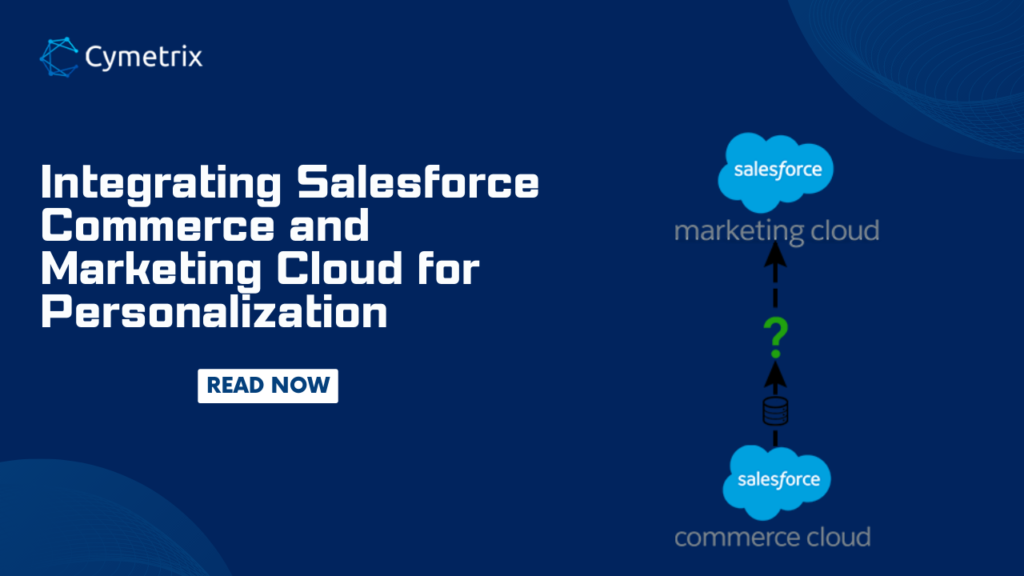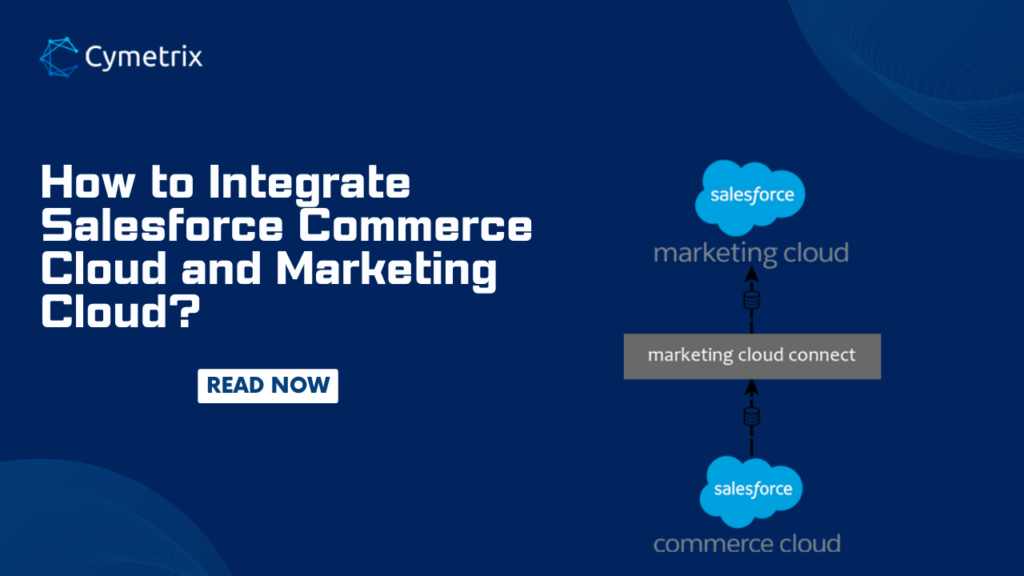
Know more about the power of integrating Salesforce Commerce Cloud & Marketing Cloud for personalized customer experiences. Discover various integration methods and ways to elevate your marketing strategies. Read now!
Are you looking to enhance customer experience and boost sales with Salesforce Commerce Cloud? Imagine having a seamless integration between Salesforce Commerce and Marketing Cloud that allows you to deliver personalized experiences at every touchpoint. How can you leverage these powerful tools to take your E-commerce business to the next level?
The Marketing Cloud consultants at Cymetrix Software, one of the most trusted Salesforce Partners, will help you understand the possibilities of integrating Salesforce Commerce and Marketing Cloud for personalization.
What is Salesforce Commerce and Marketing Cloud?
Salesforce Commerce Cloud, formerly Demandware, is a cloud-based platform that enables businesses to create and manage their online stores. It offers several features, including product catalogs, shopping carts, payment processing, and order management. On the other hand, Salesforce Marketing Cloud is a comprehensive marketing automation platform that allows businesses to create, automate, and track personalized marketing campaigns across various channels.
Why Integrate Salesforce Commerce and Marketing Cloud?
While both platforms excel at what they do individually, integrating Salesforce Commerce Cloud with Marketing Cloud can provide seamless customer experiences. So, by merging customer data, purchase history, and behavior from Commerce Cloud with Marketing Cloud’s powerful tools, businesses can create targeted and highly personalized marketing campaigns. This integration empowers companies to deliver the right message to the right audience at the right time, significantly increasing the chances of conversions and customer retention.
How does integrating Salesforce Commerce and Marketing Cloud help achieve personalization?
The Salesforce Commerce Cloud integration with Marketing Cloud is pivotal in achieving personalized customer experiences. That is a primary differentiator for businesses in today’s competitive landscape. Personalization goes beyond addressing customers with names but involves tailoring every touchpoint of the customer journey to cater to their unique preferences, interests, and needs. Let’s explore how this integration facilitates personalization and enhances customer engagement.
Unified Customer Data
The integration allows you to create a unified view of your customers. It enables customer data from Commerce Cloud, such as purchase history, browsing behavior, and preferences, to flow into Marketing Cloud without interruptions. This centralized data empowers marketers to gain comprehensive insights into each customer’s interactions and engagement across various channels.
Intelligent Segmentation
With access to rich customer data, marketers can segment their audience more intelligently. They can create dynamic customer segments based on past purchases, browsing behavior, demographics, and interactions with marketing campaigns. This level of segmentation can help you target specific customer groups with tailored messages and offers, significantly increasing the relevance and effectiveness of your marketing efforts.
Personalized Content Delivery
The integration enables you to deliver personalized content to customers across multiple channels, including email and social media. Through Marketing Cloud, marketers can design dynamic email campaigns that automatically adapt content based on customer behavior. For example, a customer who recently purchased a smartphone may receive personalized recommendations for compatible accessories.
Behavioral Triggers
A seamless integration allows businesses to set up behavioral triggers that respond to customer actions in real-time. For instance, if a customer abandons their shopping cart, Marketing Cloud can automatically send a personalized email reminding them of the items left behind and offering an exclusive discount to entice them to complete the purchase. These triggered messages capture customers’ attention at critical moments, driving conversions and nurturing relationships.
Omnichannel Personalization
Customers interact with a brand across various channels, including websites, social media, and physical stores. This integration facilitates omnichannel personalization, where the same level of tailored experiences is delivered consistently across all touchpoints.
Predictive Analytics
This integration enables businesses to leverage predictive analytics through unified customer data. So, by analyzing historical data and customer behavior patterns, marketers can predict future customer actions, preferences, and potential churn. Thus, you can proactively engage with customers to prevent churn and increase customer lifetime value.
Automated Customer Journeys
You may use this integration to develop automated customer journeys that alter dynamically based on user interactions. For example, a customer who recently purchased a new laptop may receive follow-up emails with tips on optimizing its performance or an invitation to a related webinar.

How to Integrate Salesforce Commerce Cloud and Marketing Cloud?
The Salesforce Commerce Cloud integration with Marketing Cloud opens up a world of possibilities for businesses to enhance customer engagement and deliver personalized experiences. Let’s explore some efficient ways for this integration:
Integration via REST APIs & Web Services SOAP APIs
You can use REST APIs and Web Services SOAP APIs to establish a robust integration between SFMC and SFCC. REST APIs provide access to several Marketing Cloud capabilities, including contacts, content builder, journey builder, mobile connect, mobile push, and triggered sends.
These APIs can help implement personalized marketing campaigns and automated customer journeys seamlessly.
Generating TXT or CSV Files and Uploading to Marketing Cloud FTP
This approach helps import data into Email Studio, where you can create targeted email campaigns based on the imported data.
After you’ve uploaded the data files to Marketing Cloud, you can use them to segment the target audience and activate customized marketing communications based on their interests and behavior.
Using a Marketing Cloud Connector
A Marketing Cloud Connector is a helpful tool to integrate SFCC and SFMC. It involves leveraging GitHub repositories to establish the connection between the two platforms. However, to ensure a smooth and efficient integration, it is recommended to take the assistance of Salesforce Consultants, who can assist with the setup and configuration requirements.
Using Salesforce Marketing Cloud Connect
This powerful integration allows businesses to consolidate marketing data and customer details from various touchpoints into a single view. With a unified customer profile, marketers can implement personalized marketing strategies effectively.
Before implementing this integration, it’s essential to have two users in place: a Marketing Cloud API user and a Salesforce tracking user. The data from Commerce Cloud is automatically imported into Marketing Cloud via SFTP (Secure File Transfer Protocol) at regular intervals, enabling real-time data synchronization.
Case Study: Cymetrix Software implements a complete digital marketing solution
Our Client, a Marketing Company, wanted to implement a complete digital marketing solution that would enable them to create personalized and engaging customer experiences across multiple channels.
So, the Commerce Cloud Implementation team at Cymetrix Software, a leading Salesforce Consulting Partner, helped the client to integrate Marketing Cloud with Commerce Cloud.
Through our services, our client gained a unified source of campaign data, significantly enhancing the effectiveness of their marketing campaign. Moreover, the seamless integration with Google Analytics streamlined their digital marketing efforts. Lastly, harnessing the power of Marketing Cloud and Commerce Cloud led to a noticeable surge in leads and up-selling/cross-selling opportunities.
Conclusion
In conclusion, the integration of Salesforce Commerce Cloud and Marketing Cloud represents a transformative step for businesses seeking to elevate their marketing strategies and deliver personalized customer experience.
As you embark on the journey to integrate Salesforce Commerce Cloud and Marketing Cloud, it is essential to partner with experienced Salesforce Integration experts like Cymetrix. Cymetrix brings unparalleled expertise and a deep understanding of both platforms, ensuring a smooth and successful integration process tailored to your unique business needs.
